Derek Thompson's Blog, page 9
May 19, 2016
Writers - Stop Saying Sorry!
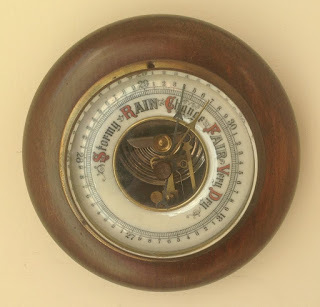 I am not, by nature, one of life's ranters. However, from time to time I encounter something - usually, it has to be said, in my own behaviour - that makes me inwardly seethe. (Except, being British, it amounts to polite irritation and some low decibel tutting.)
I am not, by nature, one of life's ranters. However, from time to time I encounter something - usually, it has to be said, in my own behaviour - that makes me inwardly seethe. (Except, being British, it amounts to polite irritation and some low decibel tutting.)The most recent example, a discussion about the validity of sentence fragments, was actually in jest. But it got me thinking about the ways in which writers can become appeasers in the scramble for good reviews, good standing in the community and a general desire to feel good. I think the logic goes that it's often hard enough dealing with your own characters or troublesome copy without having to play rock, paper, scissors in the outside world.
Earlier this week I was delighted to discover that a script of mine had been augmented and made into a short film. Naturally, I posted the link online: https://vimeo.com/122506746 and enjoyed that magic moment of realisation that a piece of my work can now be enjoyed and critiqued by others. (Although, I will say that the acting and the direction are what make the film great.) And then it hit me...that nagging concern...that some people might not like it. Not dislike it, but be offended by it, or look my other work askance (do people still do that these days?) because Wasabi is adult humour. Some writers resolve this problem by using pseudonyms. I didn't bother. I considered that most clients and friends are adult to enough to accept that we are complex creatures with many sides. And I'm sure friends of the author EL James felt the same way. Probably.
No, that nagging voice that worried what people would say was all mine. It was the same tone that suggested my fantasy, Covenant, was a little too occult for my religious friends. (Wrong, as it turns out.) Or that the thrillers were too sweary for a mainstream audience. They are, of course, for an audience that doesn't enjoy GAP (genre appropriate profanity - neat term, huh?). And that's the point.
As writers we will continually encounter people who love or loathe our work. The internet and social media has vastly increased the likelihood that you may hear from them in one form or another. That can be tough sometimes, but it is super important to know what your brands are as a copywriter or as a fiction writer (or both). You cannot be someone else's idea of you as a writer, and if that means losing business or losing fans then that's just too bad.
As a writer you have to learn to Man Up (or Woman Up, but I couldn't add a sales link for that), own your work and express yourself through your writing. So, no more apologies., please. And while I'm on this roll, writers are not there to satisfy a reader's every need. We may make them do some of the work. We may bamboozle and misdirect them. We may even, gods forbid, disappoint them from time to time. That's all part of the game.
You can no more write to appease your readers than you can subjugate your true self in order to satisfy, placate and otherwise ingratiate yourself with your family and friends. You may manage it short-term but it will eventually ooze out somewhere. Frankly, it's a fool's errand and uses up valuable energy that could be better spent writing.
Remember, you never have to justify:
- Whether you are or are not published, and by what means.
- What you use your ink for and what your fictional characters get up to.
- Prioritising time for writing.
- How much money you make from your writing.
What do you apologise for as a writer and what will it take for you to stop?
Published on May 19, 2016 23:30
May 15, 2016
Words and Pictures
 How much more evocative with two different bite marks?I was recently invited to participate in a photographic competition - as a judge, you understand. Well, I'm exaggerating; I was asked to vote. Anyway, as I walked along the rows I found myself drawn to different images for different reasons.
How much more evocative with two different bite marks?I was recently invited to participate in a photographic competition - as a judge, you understand. Well, I'm exaggerating; I was asked to vote. Anyway, as I walked along the rows I found myself drawn to different images for different reasons. Some photographers told a story, leaving you with questions and the delight of coming up with your own answers. Others showcased a particular skill - the way they used light or shade. Some were technically perfect but somehow lacking in character; although perfectly pleasant to look at they were sterile and staged.
Inevitably, especially when I realised I needed a prompt for a blog post, those photographs made me think about writing. These are those thoughts:
1. Are you writing for yourself - to demonstrate or develop a particular skill?
2. Are you writing for someone else, and if so are you clear about what you want their experience to me?
3. Is your writing kinetic? Does the story move and will it move your readers?
4. Are you keeping to the boundaries of a certain style and genre? If so, how's that working out for you and what would happen if you stepped over your own chalk marks?
I'd love to read your answers below in the comments section.
Both Anne and I (there were lost of voters) cast a vote for a black & white image. Her choice was a moment captured between two people, unposed, lost in the moment. My choice was a mother and daughter, faces in rapt surprise as something unexpected happened. Neither choice won an award but I have no doubt that each photo in the competition appealed to someone. On a different day and with a different set of judges, anything is possible. The same is true for writing, although not, I fear, for The Eurovision Song Contest!
A picture may paint a thousand words, but who is to say which words the audience receives?
Published on May 15, 2016 12:26
April 26, 2016
On the Campaign Trail
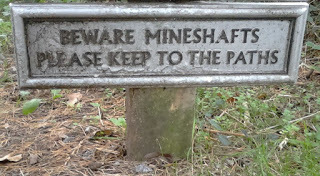 I recently branched out as a freelancer and worked on a B2B marketing campaign, engaging businesses to join an innovative web-based platform. At first, it seemed a world away from copywriting, editing or proofreading, but it soon became clear there are both transferrable skills involved and valuable crossover lessons.
I recently branched out as a freelancer and worked on a B2B marketing campaign, engaging businesses to join an innovative web-based platform. At first, it seemed a world away from copywriting, editing or proofreading, but it soon became clear there are both transferrable skills involved and valuable crossover lessons.1. Have a planIt sounds so obvious, but many freelancers and authors approach a campaign piecemeal, which can lead to confusion (on all sides!) as well as dissipated energy for the tasks.
A spreadsheet really is your best friend here, as you can work out contact dates, organisepropsects (which could also be agents or publishers) based on locality, size of business or genre. One of the great things about spreadsheets is that you can sort data to segment your target audience in different ways.
2. Break down your tasksUnderstand the sequence and the depednencies (what needs to happen first) so that each activity flows into the next. If you plan on sending out a pitch letter in month two, you need to have it written, edited and signed off in month one. One solution is to work backwards and ask the question 'what needs to have happened in order to...'. A word of advice though - make sure you fully appreciate the time required for each stage / task.
3. Work to the objectivesYay, you have a campaign planned. But what is it intended to achieve? Contact, conversions, sign-ups, brand awareness - they are all very different goals and in each case the plan and tasks need to be tailored to that individual outcome.
4. Be adaptableSometimes circumstances change and priorities have to change with them. Time, cost, quality or scope can all alter at short notice, each one of those corners that representation the foundation of your plan will impact on the other three.
5. Know what's yoursYou may be able to influence customers and clients, but you cannot control them. Predicting their choices is a tricky one too. What you can do is present your plan and its benefits (you are selling the benefits, right?) in a way that's professional, unambiguous and appealing. If you've done your research well enough, that should give you a fighting chance.
6. Measure progress and successYou need to know when to change tack, or, even better, if things are going well. What does success look like to you? Is it callbacks, or requests for a full manuscript, or sign-ups for a trial offer?
Conversely, rejections and refusals can be useful. Is your message clear enough? Have you targeted the right audience? Have you sold the benefits?
7. Play to your strengths Getting in specialists (marketing, copywriters, web designers, tech teams, etc.) is not a sign of weakness or failure. It's a sign of intelligence. Do what you're best at and bring others on board if you need to.
Derek Thompson @DerekWriteLinesColumnist, copywriter, and blogger, and more besides.
Published on April 26, 2016 23:30
April 19, 2016
Series Four. Coming Soon.
 Some say the best television shows end at series three. It's not that further series are necessarily bad, they just need to be different. The first two series of Red Dwarf, for example, felt like cult viewing; you either got it or you didn't. It was made - or appeared to be - without a greater awareness of a wider audience. Niche viewing, you might say.
Some say the best television shows end at series three. It's not that further series are necessarily bad, they just need to be different. The first two series of Red Dwarf, for example, felt like cult viewing; you either got it or you didn't. It was made - or appeared to be - without a greater awareness of a wider audience. Niche viewing, you might say.However, if a show is lucky enough to endure it will also need to progress. The writers inevitably take account of audience feedback, and the actors' strengths, and potentially the available budget and any deadline constraints. It's still art but there's a more prominent commercial aspect to it.
The more series there are, the more development there has to be; whether that's the completion of a quest (and possibly the start of another one), or characters learning something and changing as a result. Basically, some plot lines need to resolve because you can't tease and torment viewers (or readers) indefinitely. In original Battlestar Galactica saga, for example, the storyline about the search for the Earth had to end up somewhere.
Most fans of Standpoint, Line of Sight, and Cause & Effect will probably know that I'm working on the next book: Shadow State. It's my series four and comes with certain challenges and opportunities.
The opportunities are around character progress and subplot resolution (or complication!). I get to fill in more blanks this time, especially about Karl McNeill's family. There's also more chances to illustrate how Thomas Bladen has been affected by his experiences in the previous three novels. And, perhaps, a space to shine a spotlight on his relationship with Miranda Wright. (I say perhaps because that might be held over until Book Five.) By now, all of my main characters have a defined backstory and a history of interactions with one another. In a sense, I feel as though I've brought 'the gang' together now. Of course, in writing, you sometimes bring people or things together so that you can tear them apart...
As I said, there are challenges too, especially with such a large cast. Different characters demand centre stage and sometimes - in my head, you understand - refuse to play third fiddle or spear carrier no. 2. I am wondering whether the occasional spin-off short story may be a way of placating them. Another problem-ette is my own awareness of the audience now. I've been fortunate with some of the book reviews, both the bouquets and the brickbats (for some reason I love that word!). I know now, to some extent, what readers enjoy and what those who left at an earlier series didn't like. I recognise that there is a trade-off to be had between what the audience wants and what I and my characters want to give them.
Here's a hint of progressions to come, plus a red herring:- Jack Langton is coming out of prison.- Thomas has come to someone else's attention.- Thomas and Karl have unfinished business from the previous books.- Miranda won't wait forever for Thomas to commit.- Is it time for Thomas to take the lead without Karl as a safety net?- Patterns change, loyalties wane, and debts must be paid.- Maybe it's time for Thomas to finally choose a side?
For those of you who have stayed the course, Shadow State is coming...Book Four
Published on April 19, 2016 05:59
April 4, 2016
One Year On - a Q&A with a difference
 A little ago, buoyant on completing my first year as a thriller writer, I thought it would be fun to do a Q&A with a difference. I promised to answer any questions you cared to send in. Here they are, woven into an interview.
A little ago, buoyant on completing my first year as a thriller writer, I thought it would be fun to do a Q&A with a difference. I promised to answer any questions you cared to send in. Here they are, woven into an interview.1. It's been a year since your debut thriller, Standpoint, was published. Did you expect two of the follow-on books to be published so quickly?
Not for a second! I had a vague idea that it might be one every nine months, but the rate has been fantastic. It has also taught me not to obsess so much about the novels, to write them as well as I can and then move on to the next one.
2. Does that mean you see the thrillers as more of a 'job' than a creative project?
I think you could say that, and I am pleased about that transition. Jasper Joffe signed me on the basis of a five-book pitch, so I have no qualms about making good on my side of the bargain. Plus, I'm happy to confirm, the royalty payments have been good news.
3. What are the numbers?
Funny you should ask that! Chloe Banks covered this theme brilliantly in a blog post of her own and writing (probably all the Arts) seems to be an occupation where the abiding curiosity is about what you earn.
You've asked for numbers and I promised to be honest so here goes, with the caveat that Q4's royalties won't be available for another couple of months so I'm guesstimating:
Total sales: approx. 16,000.Total free downloads: approx. 50,000.Total income: approx. £9000.
The thing is, bar the numbers themselves, it tells us very little. There is no 'typical' author experience. As a friend of mine, Jem, likes to say: your mileage may vary.
4. Highlights and lowlights?
Seeing a press release in the local paper, and on the Literature Works website. Having a spot on BBC Radio Cornwall (where I managed to mispronounce one of the book titles!). Fellow writers and readers being amazingly generous with their time.
Even the bad reviews are fine if they make sense. Some would-be supporters decided not to join the Bladen bus, which is absolutely their right but disappointing nonetheless. I get that people are busy! A shame too about the highly successful author's post for me and the newspaper book review that never came to pass.
One thing that really surprised me was how few reviews we received for the 50,000 downloads. You can check out Amazon (links handily provided below) to see for yourself.
5. Do you feel shackled to Thomas Bladen now?
Not at all - he's just part of the family. My publisher has floated the idea of a crime thriller with new characters, which I'm still mulling over. I'm working on the fourth Bladen novel at the moment and I have an outline for the fifth / final (?) book.
6. What's changed for you since Standpoint came out in March 2015?
I have more experience of the publishing industry - particularly where ebooks are concerned - and consequently my expectations have changed. My books have each had a steep trajectory, peaking in weeks and fading in months. That's both exciting and humbling.
I've also learned not to fixate on Amazon's rankings, important though they are, simply because my ability to publicise my novels is limited. A year on, I have slightly more traction and a wider community to interact with (and some people - take a bow again, Mrs Campbell! - went above and beyond to support the books), but most promotional activity is down to the publisher. Fortunately for me, Jasper Joffe knows what he's doing and delivered on his promises!
If I pitch another book anywhere, I now have a track record. I did self-publish Covenant before, but that was reallyniche fantasy fiction and failed to set the literary or esoteric worlds ablaze. Now, I can cite my thriller figures as evidence of a readership and commercial viability.
The past year has also made me more confident about my own work. I know my books aren't for everyone and that, as one person put it: "Let's face it you're basically writing 21st century pulp novels to read on the train." It's a fair point and I'm happy to take the stage and say 'this is what I do'.
My horizons have widened considerably. I am currently waiting for feedback from a TV producer (no pressure, take your time!) who responded to my query and agreed to read Standpoint. It's not that I have any sense of entitlement or expectation about future projects. No, it's simply that I was writing novels in the attic until a year ago so I know that statistically improbable opportunities can and do arise. Why not think big!
As I write other things as well, I would really like to build on the past year and see my tragi-comedy novel, Scars & Stripes, land on a welcoming desk. I've thought about pitching it as as Great Expectations meets Catcher in the Wry (sic) in the 1980s.
7. Do you see the writing world as more competitive or less, since you've been published?
Both.
It's more competitive in that I can better appreciate other factors that can have a bearing on your success. Things I've never considered, like who other writers from the same publishing house have books coming out and when, where your launch date or free download period sits in relation to UK or US public holidays, the importance of finding an audience on both sides of the Atlantic.
I also see it as less competitive in that I've encountered so much goodwill (plus a few crapbags!) out there. It's one of the reasons I wanted to try and pay it forward by allocating a free hour each week for other writers. I also think - and I'm indebted to Stephen King's On Writing for reminding me of this - that my 'job' is to develop as a writer and to write as authentically and as well as I can. That's it really. The rest is secondary - has to be secondary - or I'd be too busy looking out the window to concentrate on the page.
8. Do you wish you had three novels under your belt when you were younger?
That's hard to say. It would have been different, certainly. I wouldn't have been as honest on the page because that didn't really happen until I wrote about the impact of my brother's death. If you're pushing me on this, I wish I had been a more honest and more committed writer when I was younger. I might have written more books and very different ones, which is an intriguing idea for me now.
9. What would you do if your next book doesn't sell?
Get despondent. Eat chocolate. Get writing.
Reflect. Write something else. Write better.
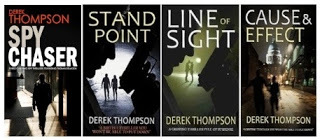
UKStandpoint http://www.amazon.co.uk//dp/B00UVQBVVU/Line of Sight http://www.amazon.co.uk//dp/B00XIOAOBK/Cause & Effect http://www.amazon.co.uk//dp/B016J62PYM/Spy Chaser http://www.amazon.co.uk//dp/B01ANPQ7DK/
USStandpoint http://www.amazon.com//dp/B00UVQBVVU/Line of Sight http://www.amazon.com//dp/B00XIOAOBK/ Cause & Effect http://www.amazon.com//dp/B016J62PYM/Spy Chaser http://www.amazon.com//dp/B01ANPQ7DK/
Published on April 04, 2016 07:49
March 27, 2016
Party politics - and not in the way you think
 An arts hole?I'm a fan of Jeff Bridges (especially Starman and The Big Lebowski) and a fan of Simon Pegg (especially Spaced and Shaun of the Dead), so the film How to Lose Friends and Alienate People was a natural choice as it featured both of them. I awarded it a bonus point awarded because it is also a film about a writer.
An arts hole?I'm a fan of Jeff Bridges (especially Starman and The Big Lebowski) and a fan of Simon Pegg (especially Spaced and Shaun of the Dead), so the film How to Lose Friends and Alienate People was a natural choice as it featured both of them. I awarded it a bonus point awarded because it is also a film about a writer. There's a line in it, which I won't bother to quote accurately (well, this is a blog...), about acerbic writers being that way because they don't have an invite to the party. It's a bit of a cliche, but like most cliches there is a vein of truth in it.
The reality, however, is that we all have our faces pressed at the window of the next party, the next inner circle, or the next opportunity that will somehow change our trajectory as writers.
Since Standpoint was published approximately 12 months ago I have been on a literary rollercoaster. twisting and turning through the contract, the edits, the final proof, publication, and promotions. For a short while I enjoyed the perspective of a published writer and then plunged back into a follow-up novel to start the whole process again with Line of Sight, and after that Cause & Effect came out as the third book in the series.
All of which is lovely, but there are still parties beyond the glass. Some of them are small affairs - getting more sales and especially more reviews (the order sounds counter-intuitive but many writers would agree with me), and being invited as a guest on other people's blogs. Other parties seem exclusive to the point of impossibility - selling the rights for TV or film (and not just so that Sarah Campbell can become an extra!), doing a book tour, being invited to attend a writing conference as a speaker, or having a book reviewed by a national newspaper.
This month marks the end of my first full year as a published author. It's a party that I know others are keen to get an invite to, even as I'm gazing at the next glass wall. Along the way I've been asked some pointed and challenging questions, so my next blog will tackle those in a warts-and-all Q&A. There's still time to add a question to the list, by:
a) Commenting here.
b) Contacting me on Twitter - @DerekWriteLines
c) Contacting me via Facebook - /professionalwriter1
I chose the above image because I saw it on my travels in Penzance, and also because it reminded me of Marcel Duchamp, who shocked the art world by presenting a urinal out of context as art. Except, as we now know, he actually appropriated the idea from Elsa von Freytag-Loringhoven - which was really taking the piss.
Published on March 27, 2016 09:17
March 23, 2016
How to win at the freelancing game
How to win at the freelancing game Seven counter-intuitive ideas that actually work.
1. Be unavailableWhen you first start out you want to spend as much time as possible on your computer. After all, the Internet doesn't keep office hours, so why should you? Surely all clients will be grateful for that? Not necessarily. Same may see it as desperation and price your work accordingly. (I speak from experience here.)
However, if you allocate blocks of time to clients, along with the best times to contact you, you're letting them know that even if their projects rock your world they're not the centre of it.
When you build up a relationship with a client, based on trust and economics, it will make good business sense to re-prioritise if the job calls for it. Until then, schedule your work as if you were an employee. Set time aside for marketing, lunch, pitching, accounts and all the other mission critical tasks that your business depends upon.
2. Over-deliverYou can add value by improving upon an agreed deadline, or providing more content - or more detailed content - than they were prepared to pay for (but still asked for in the original price!). It shows you are capable and, once you've ably demonstrated your capabilities, you're in a good position to negotiate a better price next time.
NB If you exceed the agreed expectations, make sure they're aware of it.
3. Offer a discountBefore you run to the hills, screaming, hear me out. Under the right circumstances a discount can work in your favour.
Examples:- Your base rate remains but there's a 20% discount on extra work ordered the same week.- A 20% discount if you pay for five pieces in advance.- A 20% discount to the client on all work that month if someone they you to buys £300 of work in advance.
In each case the discount is dependent upon you getting something extra in return.
4. Give content for freeI know. Sometimes this one hurts. Again, use judiciously.
Examples:- Four pieces for the price of three, if bought in advance.- A second rights piece (with your byline and back link) to accompany the piece they bought.- A review copy of an ebook, for which you'd reallyappreciate an online review.- A white paper that relates to their business and references your own.
Similar to discounts, a freebie needs to be more than an act of generosity (they're okay too from time to time though) if it's a business decision.
5. Make yourself indispensableThis is not the same as being available 24/7. You can become indispensable by offering other services, once you understand the client's business.
Writing copy is closely associated with marketing and promotions, or proofreading existing literature, or editing website content.
6. Become an ambassadorMost freelancers I know have an active online presence. They are happy to share content attributed to their name and spread the word to their followers and contacts. This represents free advertising to clients and access to new potential markets, and they'll love you for it.
7. Cross-pollinateAlthough comparison sites have revolutionised consumer behaviour, often we're just as happy to go with a personal recommendation. As a freelancer you will likely encounter fellow writers, web designers, graphic designers, marketeers, sales teams, etc. Sometimes, for example when you are busy but you don't want to disappoint a client, you can even recommend a competitor (ideally, one you have a reciprocal relationship with) to handle the work in your place. This is alwaysbetter than trying some sneaky subcontracting sleight of hand.
When you can wholeheartedly recommend another professional (whether there they offer a discount for it or not!), you are able to solve another of your client's problems. Who wouldn't want to do business with someone like that again?
* * * So there you have it. A little creative thinking, intelligently applied, that can elevate your reputation and set you apart from the competition.
Which is the perfect opportunity to all of you a free comedy ebook (100 gags - a quick read!) in return for a review on Amazon.
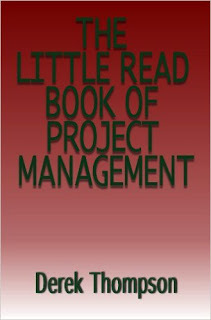
Send me a DM on Twitter - @DerekWriteLines - if you're interested
Amazon UKhttp://www.amazon.co.uk/Little-Read-Book-Project-Management-ebook/dp/B00KEAUM4K
Amazon UShttp://www.amazon.com/Little-Read-Book-Project-Management-ebook/dp/B00KEAUM4K
1. Be unavailableWhen you first start out you want to spend as much time as possible on your computer. After all, the Internet doesn't keep office hours, so why should you? Surely all clients will be grateful for that? Not necessarily. Same may see it as desperation and price your work accordingly. (I speak from experience here.)
However, if you allocate blocks of time to clients, along with the best times to contact you, you're letting them know that even if their projects rock your world they're not the centre of it.
When you build up a relationship with a client, based on trust and economics, it will make good business sense to re-prioritise if the job calls for it. Until then, schedule your work as if you were an employee. Set time aside for marketing, lunch, pitching, accounts and all the other mission critical tasks that your business depends upon.
2. Over-deliverYou can add value by improving upon an agreed deadline, or providing more content - or more detailed content - than they were prepared to pay for (but still asked for in the original price!). It shows you are capable and, once you've ably demonstrated your capabilities, you're in a good position to negotiate a better price next time.
NB If you exceed the agreed expectations, make sure they're aware of it.
3. Offer a discountBefore you run to the hills, screaming, hear me out. Under the right circumstances a discount can work in your favour.
Examples:- Your base rate remains but there's a 20% discount on extra work ordered the same week.- A 20% discount if you pay for five pieces in advance.- A 20% discount to the client on all work that month if someone they you to buys £300 of work in advance.
In each case the discount is dependent upon you getting something extra in return.
4. Give content for freeI know. Sometimes this one hurts. Again, use judiciously.
Examples:- Four pieces for the price of three, if bought in advance.- A second rights piece (with your byline and back link) to accompany the piece they bought.- A review copy of an ebook, for which you'd reallyappreciate an online review.- A white paper that relates to their business and references your own.
Similar to discounts, a freebie needs to be more than an act of generosity (they're okay too from time to time though) if it's a business decision.
5. Make yourself indispensableThis is not the same as being available 24/7. You can become indispensable by offering other services, once you understand the client's business.
Writing copy is closely associated with marketing and promotions, or proofreading existing literature, or editing website content.
6. Become an ambassadorMost freelancers I know have an active online presence. They are happy to share content attributed to their name and spread the word to their followers and contacts. This represents free advertising to clients and access to new potential markets, and they'll love you for it.
7. Cross-pollinateAlthough comparison sites have revolutionised consumer behaviour, often we're just as happy to go with a personal recommendation. As a freelancer you will likely encounter fellow writers, web designers, graphic designers, marketeers, sales teams, etc. Sometimes, for example when you are busy but you don't want to disappoint a client, you can even recommend a competitor (ideally, one you have a reciprocal relationship with) to handle the work in your place. This is alwaysbetter than trying some sneaky subcontracting sleight of hand.
When you can wholeheartedly recommend another professional (whether there they offer a discount for it or not!), you are able to solve another of your client's problems. Who wouldn't want to do business with someone like that again?
* * * So there you have it. A little creative thinking, intelligently applied, that can elevate your reputation and set you apart from the competition.
Which is the perfect opportunity to all of you a free comedy ebook (100 gags - a quick read!) in return for a review on Amazon.

Send me a DM on Twitter - @DerekWriteLines - if you're interested
Amazon UKhttp://www.amazon.co.uk/Little-Read-Book-Project-Management-ebook/dp/B00KEAUM4K
Amazon UShttp://www.amazon.com/Little-Read-Book-Project-Management-ebook/dp/B00KEAUM4K
Published on March 23, 2016 14:02
March 11, 2016
Writers in films
I was watching a film noir classic on MUBI last week and it got me thinking about all the films that have writers in the spotlight. Some offer a sliver of insight into the writing process, some perpetuate myths, and some are just entertaining.
Here are the ones I could recall at the kitchen table that I have seen, and would recommend:
Her Alibi - Tom Selleck's murder mystery author takes unusual steps to overcome writer's block, vouching for a murder suspect he barely knows. We've all been there, desperate for inspiration.
In a Lonely Place - Humphrey Bogart's washed-up screenwriter prefers the bottle to a pen, until he meets a mysterious neighbour. It's bad timing that a woman is murdered, he's the last known person to see her alive, and the police see him as the prime (only!) suspect. Writers are naturally suspicious and curious - not a good combination if you're the one under scrutiny.
Adaptation - Nicholas Cage plays twins, a seasoned scriptwriter struggling with an adaptation (see what they did there...) of a well-known and tricksy novel, and his down-to-earth brother who decides to write his own film script. The film explores the writer's internal process and what artistic rivalry looks like up close and personal. Perfect viewing for any author who lamest that their artistic creation gets less airtime in cyberspace than the latest slasher / thriller / bodice ripper.
My House in Umbria - Dame Maggie Smith is a prolific romantic novelist, projecting on to the page a life very different from her own. When tragedy strikes she finds new meaning in the people around her and accidentally hears what one reader really thinks of her prose. That scene could be sponsored by Amazon!
Misery - James Caan learns that his biggest fan can also be his biggest nightmare. On the plus side, his novelist is a great example of working to a deadline and writing / rewriting to order. Fear is a greater motivator.
Iris - Dame Judi Dench shows the side of writers that's rarely appreciated by readers. Experimental, far from perfect, and challenging to be around, sometimes the closest writers can get to truth is in our fiction. It can be hard for friends and partners. Here's a quote from the film that speaks volumes: I should feel like a deprived animal if I can't write.
Murder, She Wrote - Angela Lansbury's sleuth and novelist epitomises the writer's curiosity and her time management skills (solving murders, writing novels and doing the promo work) set a high benchmark. You could say that she writes some killer prose.
Anyway, that's my selection. Which films would you have chosen?
Here are the ones I could recall at the kitchen table that I have seen, and would recommend:
Her Alibi - Tom Selleck's murder mystery author takes unusual steps to overcome writer's block, vouching for a murder suspect he barely knows. We've all been there, desperate for inspiration.
In a Lonely Place - Humphrey Bogart's washed-up screenwriter prefers the bottle to a pen, until he meets a mysterious neighbour. It's bad timing that a woman is murdered, he's the last known person to see her alive, and the police see him as the prime (only!) suspect. Writers are naturally suspicious and curious - not a good combination if you're the one under scrutiny.
Adaptation - Nicholas Cage plays twins, a seasoned scriptwriter struggling with an adaptation (see what they did there...) of a well-known and tricksy novel, and his down-to-earth brother who decides to write his own film script. The film explores the writer's internal process and what artistic rivalry looks like up close and personal. Perfect viewing for any author who lamest that their artistic creation gets less airtime in cyberspace than the latest slasher / thriller / bodice ripper.
My House in Umbria - Dame Maggie Smith is a prolific romantic novelist, projecting on to the page a life very different from her own. When tragedy strikes she finds new meaning in the people around her and accidentally hears what one reader really thinks of her prose. That scene could be sponsored by Amazon!
Misery - James Caan learns that his biggest fan can also be his biggest nightmare. On the plus side, his novelist is a great example of working to a deadline and writing / rewriting to order. Fear is a greater motivator.
Iris - Dame Judi Dench shows the side of writers that's rarely appreciated by readers. Experimental, far from perfect, and challenging to be around, sometimes the closest writers can get to truth is in our fiction. It can be hard for friends and partners. Here's a quote from the film that speaks volumes: I should feel like a deprived animal if I can't write.
Murder, She Wrote - Angela Lansbury's sleuth and novelist epitomises the writer's curiosity and her time management skills (solving murders, writing novels and doing the promo work) set a high benchmark. You could say that she writes some killer prose.
Anyway, that's my selection. Which films would you have chosen?
Published on March 11, 2016 06:15
February 29, 2016
Created Expectations
A little freeform blogging on a calendrical adjustment.
Feb 29th is an unusual day. Partners propose, workers appear to work an extra this month for no extra pay (I used to ask my boss about it, but I never got a straight answer) and there's a certain sense of being out of step with the norm. Add to that the controversy over the Oscars this year - brilliantly addressed by Chris Rock's storming monologue - and I can't help thinking about expectations. I speak from the perspective of a white 'emerging author' (I made that term up) so I can't say anything useful about diversity and inclusivity in the entertainment industry, or comment meaningfully on when an expectation is reasonable and justified. What I can talk about is a writer's expectations, and how valid they might be.
My first 'break' was a contract offer from Samhain publishing for my magical fantasy, Covenant. Some of you may know that Samhain has recently decided to close its doors. It would be hard to describe my utter joy at receiving that acceptance email and my expectation was that editing and publication would be followed in due course by some degree of success and further books. What actually happened was that the editor died and her replacement didn't like the book at all and the offer was swiftly withdrawn. These things happen.
That same novel went to an independent European publisher who both liked and understood the book. However, owing to personal and professional challenges, the main editor was unable to edit it in a year. We parted company on good terms. Finally, a UK publisher wanted to take on the book but only if I made an author's contribution amounting to over £5000. That, believe me, was certainly unexpected! I like to think of it as five thousand reasons to self-publish a book.
Our expectations can be based upon many things:
- Feedback from readers, editorial reports and fellow writers.
- Bright optimism.
- Delusion.
- Our needs as a writer.
- What the course tutor said.
- What those 'how to write a novel' books told us.
- What we think we see going on around us.
- How our peers are doing.
The truth, rarely spoken but commonly acknowledged - often in the presence of alcohol - is that no one really knows and there is no cast iron or solid gold guarantee. And while we may be frustrated by that and occasionally devastated, it also offers the possibility of possibility.
Because sometimes our expectations can be exceeded.
Readers champion our books, publishers invest in our creativity and editors ask to see the full manuscript.
I know of which I speak. A little over a year ago I approached Joffe Books with one fully completed (novelists know there's a difference between completed and fully completed!) thriller. Thirteen months later I am busy on the fourth book in the series and there's every possibility (that word again) that a producer may read the first novel. It could all go south tomorrow or I could get a TV series. Those are the two extremes. Neither of them are real because they exist only in my head. What matters is how I behave in the light of those expectations.
Do I write?
Do I edit?
Do I submit material?
In the end, irrespective of what is or is not going on around us, we have very few actual choices. Maybe that's a good thing.
Feb 29th is an unusual day. Partners propose, workers appear to work an extra this month for no extra pay (I used to ask my boss about it, but I never got a straight answer) and there's a certain sense of being out of step with the norm. Add to that the controversy over the Oscars this year - brilliantly addressed by Chris Rock's storming monologue - and I can't help thinking about expectations. I speak from the perspective of a white 'emerging author' (I made that term up) so I can't say anything useful about diversity and inclusivity in the entertainment industry, or comment meaningfully on when an expectation is reasonable and justified. What I can talk about is a writer's expectations, and how valid they might be.
My first 'break' was a contract offer from Samhain publishing for my magical fantasy, Covenant. Some of you may know that Samhain has recently decided to close its doors. It would be hard to describe my utter joy at receiving that acceptance email and my expectation was that editing and publication would be followed in due course by some degree of success and further books. What actually happened was that the editor died and her replacement didn't like the book at all and the offer was swiftly withdrawn. These things happen.
That same novel went to an independent European publisher who both liked and understood the book. However, owing to personal and professional challenges, the main editor was unable to edit it in a year. We parted company on good terms. Finally, a UK publisher wanted to take on the book but only if I made an author's contribution amounting to over £5000. That, believe me, was certainly unexpected! I like to think of it as five thousand reasons to self-publish a book.
Our expectations can be based upon many things:
- Feedback from readers, editorial reports and fellow writers.
- Bright optimism.
- Delusion.
- Our needs as a writer.
- What the course tutor said.
- What those 'how to write a novel' books told us.
- What we think we see going on around us.
- How our peers are doing.
The truth, rarely spoken but commonly acknowledged - often in the presence of alcohol - is that no one really knows and there is no cast iron or solid gold guarantee. And while we may be frustrated by that and occasionally devastated, it also offers the possibility of possibility.
Because sometimes our expectations can be exceeded.
Readers champion our books, publishers invest in our creativity and editors ask to see the full manuscript.
I know of which I speak. A little over a year ago I approached Joffe Books with one fully completed (novelists know there's a difference between completed and fully completed!) thriller. Thirteen months later I am busy on the fourth book in the series and there's every possibility (that word again) that a producer may read the first novel. It could all go south tomorrow or I could get a TV series. Those are the two extremes. Neither of them are real because they exist only in my head. What matters is how I behave in the light of those expectations.
Do I write?
Do I edit?
Do I submit material?
In the end, irrespective of what is or is not going on around us, we have very few actual choices. Maybe that's a good thing.
Published on February 29, 2016 06:47
February 16, 2016
Capital Crimes
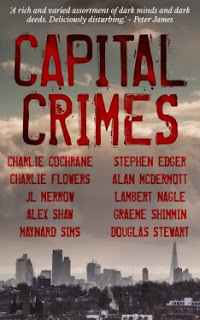 How many of us have travelled into work or sipped our morning coffee at home, thinking about how we'd commit the perfect crime? Since Edgar Allan Poe's The Rue Morgue was first published in 1841 we've taken short crime fiction to our darkened hearts like no other genre. Revenge, justice, greed, power, madness, the thrill of it, a crime of passion, an unfortunate mistake or a matter of business - take your pick.
How many of us have travelled into work or sipped our morning coffee at home, thinking about how we'd commit the perfect crime? Since Edgar Allan Poe's The Rue Morgue was first published in 1841 we've taken short crime fiction to our darkened hearts like no other genre. Revenge, justice, greed, power, madness, the thrill of it, a crime of passion, an unfortunate mistake or a matter of business - take your pick. Luckily, ten members of the International Thriller Writer’s Organisation have already done the thinking for you in Capital Crimes - an exciting anthology of short stories with a foreword by internationally acclaimed novelist and best-selling author, Peter James.
And for a limited period, crime does pay - for you, the reader. Capital Crimes is available as a FREE download until February 19th. It's also available in print.
Links:
http://endeavourpress.com/books/capital-crimes-by-douglas-stewart-charlie-flowers-and-others/
http://www.amazon.co.uk/Capital-Crimes-Douglas-Stewart-ebook/dp/B019QSJFV6?tag=geolinker-21
It'd be a crime to miss out!
Information provided by my fellow ITW member, Charlie Cochrane.
Mysteries with a dash of slash, romances with just a pinch of spice. www.charliecochrane.co.uk
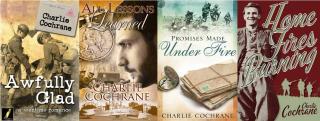
Published on February 16, 2016 05:15



